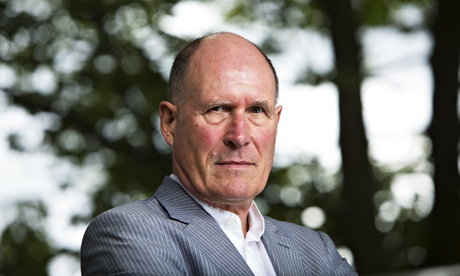
William Nicholson is the author of numerous novels for adults and teenagers. As a screenwriter his credits include Shadowlands, Gladiator, Les Misérables and Mandela: Long Walk to Freedom. He was awarded an OBE in the New Year’s honours list and his latest novel is The Lovers of Amherst.
What are the advantages of combining your career as a novelist with that of Hollywood screenwriter?
The obvious advantage is that it’s fun. The trade off is that in Hollywood you have no power. In terms of its effect on my life and work I think it’s very good: people push you to produce work you didn’t know you had in you, and you can never get a fancy idea of yourself because in Hollywood you get sacked a lot. When a project goes down that you believed was good, it can be very disheartening, but you grow up. The other thing about working in the film world is that because writers get such strong criticism, if you can take it – and you have to have a very robust ego to take it – it makes you better. It’s like going into a wind tunnel, it just strips off all the crap. I think that is probably a good thing but you don’t want too much of it because it can destroy you.
Your new novel centres on the poet Emily Dickinson. Have you always wanted to write about her?
I’ve always loved her poems. I’ve always been interested in religious subjects and relationships, and here was a woman struggling with issues of loneliness, meaninglessness, value and beauty, excitement and wonder, all in such a tiny compass. A lot of people in this country don’t know her and I felt quite missionary about it, I thought one day I’ll do something that will spread the word and enable me to balance Emily Dickinson’s poems with ideas that I have, but for a long time I couldn’t work out how to do this.
So where did the novel come from?
About 30 years ago, Polly Longsworth’s book appeared about the affair between Mabel Todd and Austin Dickinson, Emily’s brother. I was astonished to read it, because it’s not what you expect of New England Victorian folk, that sexual freedom. But I was also fascinated by the role Emily played. All we really know is that the adulterous affair happened in her dining room and this image never left my brain. So there’s a lot of getting into the mind of this woman who chose to be a recluse.
It feels very cinematic in the way you play with points of view. Does your screenwriter’s eye inform the way you write novels?
I suppose it must be true because I do a lot of screenwork, but then Dickens had a very visual way of writing, so did Tolstoy, and they weren’t screenwriters. I think screenwriting has given me permission to be much bolder with sentence structure and cutting, you might call it.
Does working for stage and screen give you a greater sense of discipline in terms of structure?
Certainly. Working in popular entertainment demands story, so that has become a very good discipline. But what has happened is that because popular entertainment is so massive and powerful, and because it tends to be very strongly story-based, the idea has grown up that highbrow work should not be story-based, and I think this is sad. I don’t know how it’s happened because it used to be that the greatest works were very accessible and exciting. One of the things I have regretted is that because I do films it’s assumed that I can’t be doing anything very clever in books, on the grounds that you’re either popular or you’re highbrow. I think you’re as good as what you do.
Do you find that your books are packaged towards female readers, because they deal with families and relationships?
Very much so. I wish they didn’t have to have pictures of wistful women on the covers. When I wrote the first novel of this sequence, it was offered to a publisher who said, “I absolutely love this book, if you were a woman I would publish it but I can’t publish it under a man’s name.” They suggested a pseudonym and of course I thought about that but it’s like a swindle. If it has any value to a woman reading, it should be because I’m writing about emotions from a man’s point of view. I would love men to be my readers too, and I am speaking to male readers because I’m saying things that I know men think and feel and daren’t say. I’m talking about confessing their fears and weaknesses.
The Lovers of Amherst is published by Quercus (£16.99). Click here to order a copy for £13.59

